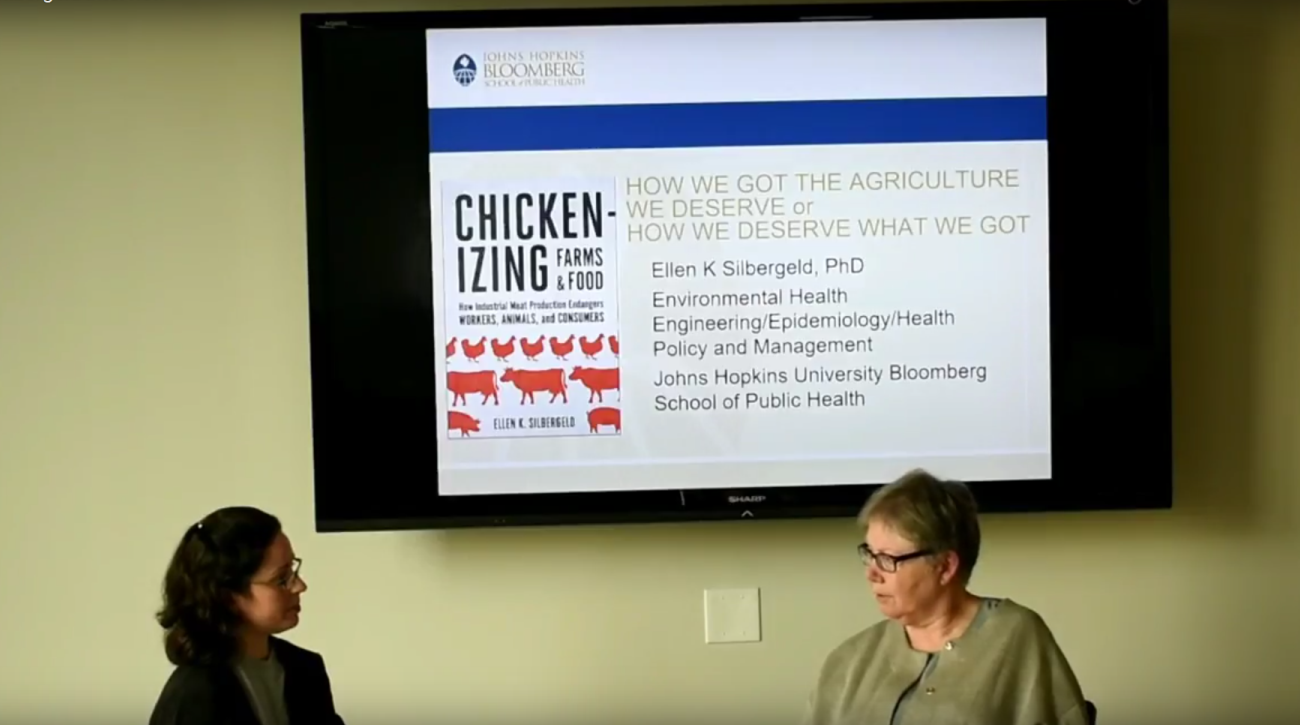Professor Ellen Silbergeld, PhD, of the Bloomberg School of Public Health at Johns Hopkins University spoke about her new book at a seminar held by the Department of Environmental and Occupational Health (EOH) at GW’s Milken Institute School of Public Health. The department brings in one or two experts each month to discuss their research, and these seminars are one of the ways our students learn about current EOH topics.
In her talk, “Chickenizing: How Industrial Meat Production Endangers Workers, Animals, and Consumers,” Silbergeld spoke about the research into the approach to food animal production initially involving chicken that spread to other food animals and has become known as chickenizing. Silbergeld’s many honors include a MacArthur Genius grant, and her research into how new food animal production methods, feed additives, and social economic structures have transformed agriculture in the U.S. and abroad led her to write her book, Chickenizing Farms and Food.
Silbergeld spoke about what she sees as the dilemma of modern food animal production: the negative consequences of chickenizing for workers, consumers and the environment and the need for efficient high production to feed our world’s growing population and respond to the world’s peoples’ changing diets. Her interest in the topic was initially piqued by her research into how practices of Maryland poultry farmers impacted the state’s Chesapeake Bay, and she ultimately came to look at the issue from a global perspective. She spoke about the history of how antibiotics came to be used to increase food animals’ growth rates and the how these uses contribute to the life-threatening issue of antibiotic resistant bacteria.
Silbergeld also spoke more broadly about aspects of how we raise animals that she argues are in need of reform, including creating safe workplaces, effective management of animal welfare, improved treatment of food animal production wastes, and monitoring of both animal and worker health. Silbergeld acknowledges that her research shows that no easy solutions exist to address these issues in a way that produces affordable food for the world. You can view her entire presentation here.
After the seminar, Sarah Luciano, a student in the EOH Global Environmental Health MPH program who is a licensed veterinarian, asked Silbergeld about other industrialized countries that are doing a better job with industrialized animal production. Silbergeld responded with some examples which give her hope that change is possible.
Silbergeld stresses that we must stop using antibiotics for non-therapeutic reasons in animal production. “Getting accurate information about the use of antibiotics in food animal production, having the right to inspect facilities and to require changes, empowering veterinarians in a real way and giving them real responsibility of managing the use of drugs, as well as the care of animals” are all ways that countries can improve their animal production, Silbergeld says. She recognizes Denmark and other Scandinavian countries for taking these steps and conducting research which shows that they can make a real difference.
View the interview, which includes Silbergeld’s observations on why finding a global solution to improve how we raise animals is important, here.


